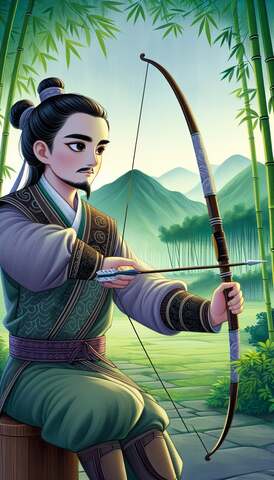
在很久以前,有一位名叫子谦的射手。
他是个非常讲究“仁之道”的人。
射箭的时候,子谦会让自己身心端正,然后才把箭射出去。
有一天,子谦参加了一场射箭比赛。
他和另一位射手——叫做子瑜的人进行对决。
在比赛开始之前,他们互相行礼,表现得非常有礼貌。
比赛结束后,不管谁赢了,他们都会敬酒给对方,表示尊重。
这是君子之间的比试方式。
但是,在比赛中,子谦并没有射中目标。
这时,他没有埋怨别人技术比自己好,而是反过来检讨自己,找出自己的不足,然后再去改进。
这就是“反求诸己”的意思。
它告诉我们,无论做什么事情,都应该先要求自己,找出自己的缺点,努力改正。
只有这样,我们才能把事情做好。
所以,当你遇到困难或者失败的时候,不要怪别人,要多想想自己。
看看自己哪里做得不够好,然后努力去改变,这样才能成为一个真正的高手。
Long ago, there was a marksman named Ziqian.
He was a person who valued the way of benevolence very much.
When shooting arrows, Ziqian would straighten his body and mind before releasing the arrow.
One day, Ziqian participated in an archery competition.
He competed against another archer named Ziyu.
Before the start of the game, they saluted each other politely.
After the game, no matter who won, they would toast to each other as a sign of respect.
This was the way gentlemen competed with each other.
But during the competition, Ziqian did not hit the target.
At this time, he did not blame others for being better than himself, but instead reflected on himself, found his own shortcomings, and then tried to improve.
This is what 'looking inward' means.
It tells us that no matter what we do, we should first demand ourselves, find our own shortcomings, and strive to correct them.
Only in this way can we do things well.
So, when you encounter difficulties or failures, don't blame others, think more about yourself.
See where you are not doing well enough, and then try hard to change, so that you can become a true master.